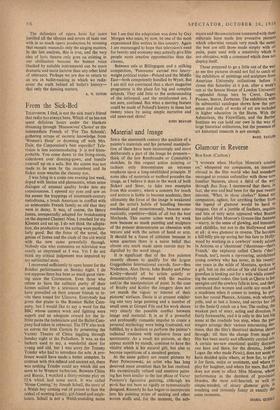From the Sick-Bed
TELEVISION, I find, is not the sick man's friend that radio has always been. Which of us has not spent delicious hours under the blankets drea,ming through 'Housewives' Choice' or the intermediate French of For The Schools'; gathering scraps of esoteric knowledge from 'Women's Hour' or drowsing off with Mrs. Dale, the Corporation's best soporific? Tele- vision is less accommodating. It is not trans- portable. You come down to the living-room, eiderdown over dressing-gown, and bundle yourself up on a sofa. But the screen was not made to be seen by the recumbent and its flicker soon wearies the rheumy eye.
I was lying in a coma one evening last week, doped with linctus and phenacetin, when some dialogue of unusual quality broke into my consciousness. I opened my eyes and saw on the screen the trappings of nineteenth-century melodrama, a brash American in conflict with an aristocratic French family so old that they were in decay. It was, of course, the Henry James, unexpectedly adapted for broadcasting on the depised Channel Nine. I reached for my Kleenex and sat up. I do not think the adapta- tion, the production or the acting were particu- larly good. But the force of the novel, the genius of James and the clash of the old world with the new came powerfully through. Nobody else who comments on television was nearly so impressed as I was. Yet I do not think my critical judgement was impaired by my subliminal state.
I recovered sufficiently to open house for the Bolshoi performance on Sunday night. I do not suppose there has been so much guest view- ing since the Coronation. Even those who refuse to have the cultural purity of their homes sullied by a television set seemed to have prevailed on their coarser friends to in- vite them round for Ulanova. Everybody has given due praise to the Russian Ballet Com- pany, but I would like to say a word for the BBC whose camera work and lighting were superb and an adequate reward for the in- finite pains the technicians and the Ballet Com- pany had taken in rehearsal. The ITV also took us across the Iron Curtain by presenting the Variety Theatre of China juggling through Sunday night at the Palladium. It was, as the ' barkers used to say, a wonderful show for young and old, but I was sorry for Tommy Trinder who had to introduce the acts. A pro- fessor would have made a better compere. In contrast with this refined and ancient art, there was nothing Trinder could say which did not seem to be Western barbarism. Between China and Russia, I watched a thirty-minute play on 1TA which had some merit. It was called 'Home Coming,' by Joseph Schull, the story of a Welsh boy coming out of prison to face the ordeal of meeting family, girl friend and neigh- bours. Schull is not a Welsh-sounding name but 1 sec that the adaptation was done by Guy Morgan who must, by now, be one of the most experienced film writers in this country. Again I am encouraged to hope that television's need for brevity and economy may,actually give film people more creative opportunities than the cinema, Between eels at Billingsgate and a milking competition, 'Panorama' carried two heavy- weight political topics—Poland and the Middle East—both competently handled by Wyatt. But I am still not convinced that a short magazine programme is the place for big and complex subjects. They add little to the understanding of the informed, and the uninformed are, I am sure, confused. But what a moving feature could be made of Poland'i history in these last twenty years by using simple narrative and old news-reel shots!
JOHN BEAVM4










































 Previous page
Previous page